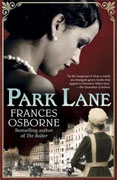Park Lane
Frances Osborne
book reviews:
· general fiction
· chick lit/romance
· sci-fi/fantasy
· graphic novels
· nonfiction
· audio books
· author interviews
· children's books @
curledupkids.com
· DVD reviews @
curledupdvd.com
newsletter
win books
buy online
links
home
for authors
& publishers
for reviewers

 |
Park Lane Frances Osborne Vintage Paperback 336 pages June 2012 |
|
Moving from 1914 to the Great War’s aftermath, Frances Osborne explores the critical struggles of Emmeline Pankhurst (1858-1928), the British political activist and leader of the suffragette movement that helped women win the right to vote. Pankhurst was widely criticized for her militant tactics, but her work was also recognized as crucial in achieving women's suffrage. Osborne posits how the experiences of this first pre-War wave of suffragists grew out of their sense of anger at a patriarchic pre-War society.
Osborne depicts a society on the cusp of change, a world embroiled in the conflicts of modern/rural, city/country, and the smug, male-dominated society that tried to stamp out this new, vital proto-feminism, a movement manifested in the travails of Osborne’s main character, Bea Masters. Like Grace, Bea’s journey is one of transformation as she moves from privileged parties and balls to her new life as a member of Emmeline Pankhurst’s bunch of “half-mad, club-wielding women.” In this landscape of upstairs-downstairs, Osborne segues from the red brick and white pillars of Pankhurst’s Lauderdale Mansion to the privileged Park Lane residence of the Masters family. Through her artistic and scandalously “bohemian” Aunt Celeste, Bea learns there is more to life than dinners, gramophones, and “ruddy-faced sportsman with a decaying houses in the country.” While Bea is viewed as the living personification of the unapologetically bourgeois, Grace finds herself the embodiment of the resigned, desperate working class. Propelled by the radical politics of her brother Michael, who instills in her the notion that “the rich are parasites who keep their eyes shut and their hearts empty, ” Grace is perhaps finally on the cusp of discovering a brave new world. The novel begins with Osborne depicting the angst and melancholy of London at the edge of war: starving waitresses; white-and-green sashed women who appear from every corner brandishing leaflets; rootless, battle-weary soldiers; and a population living in twin fears of commitment and imminent destruction from the nightly German zeppelin raids. While this aspect of the novel is strong and moving, Osborne’s method of extemporizing the action through the inner monologues of Grace and Bea grows a bit tedious in the context of showing the true gravitas behind each woman’s desires--most particularly Bea, as she becomes a part of the war effort and a living, heroic symbol of its exhaustion, suffering and grief. In Grace and Bea, Osborne has created a perfect embodiment of the eternal conflict between reason and passion. After a rocky beginning, Bea is mesmerized by Mrs. Pankhurst and her cohorts while her mind plays with the potential consequences of getting involved: the fallout from self-aggrandizing older sister Clemmie and “the small tidal wave" of class and propiety that is her mother. Grace sees her life "going one way and then the other" after being kissed by Joseph, the handsome footman. When she steals a library book that nobody has read in years, she hopes the volatile subject matter will better explain Michael's radical talk of workers rights. Although the actual plot of Park Lane Originally published on Curled Up With A Good Book at www.curledup.com. © Michael Leonard, 2012 |
|
|
|
 Click here to learn more about this month's sponsor! |
|
| fiction · sf/f · comic books · nonfiction · audio newsletter · free book contest · buy books online review index · links · · authors & publishers reviewers |
|
| site by ELBO Computing Resources, Inc. | |
 In this complex novel, social classes, ways of life, and the
realpolitik in the aftermath of the Great War is characterized by Grace Campbell.
She travels from Carlisle, Scotland, to London, finding employment as a housemaid at Number 35 Park Lane, the home of the wealthy Masters family. While the house itself is like a grand palace overlooking Hyde Park, Grace notices that the interiors have seen better days.
Regardless, she is just thankful she was able to convince the housekeeper, Mrs. Wainright, to take on her on.
In this complex novel, social classes, ways of life, and the
realpolitik in the aftermath of the Great War is characterized by Grace Campbell.
She travels from Carlisle, Scotland, to London, finding employment as a housemaid at Number 35 Park Lane, the home of the wealthy Masters family. While the house itself is like a grand palace overlooking Hyde Park, Grace notices that the interiors have seen better days.
Regardless, she is just thankful she was able to convince the housekeeper, Mrs. Wainright, to take on her on.